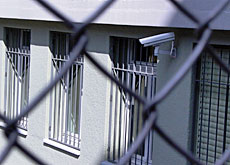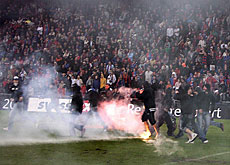Shadow of September 11 stretches to Switzerland

The United States' response to the al-Qaeda attacks on September 11, 2001 resulted in limits on basic rights. Switzerland now wants to follow suit.
With its tightened law for national security, the Swiss government wants access to the private lives of citizens – even if they are not suspected of any crimes. Not everyone is happy about this.
Six weeks after suicide aeroplane attacks on New York, Virginia and Pennsylvania killed almost 3,000 people excluding the 19 hijackers, President Bush signed the Patriot Act.
The act, which was renewed in March 2006, dramatically expanded the authority of the US to fight potential terrorist acts both at home and abroad.
Critics claim that some portions of the act allow US law enforcement to infringe upon freedom of speech, freedom of the press, human rights and right to privacy. The act also obliges all airlines to hand over to the US authorities lists with data on every passenger.
In Switzerland, the then Justice Minister Ruth Metzler wasted no time in signing an Operative Working Arrangement with the US, in which both countries agreed to share secret information in the fight against terrorists, such as financial sources.
But by and large the Swiss reaction to the attacks was calm and considered. “It was positive to see the government not rushing into any knee-jerk legislation,” Hanspeter Thür, the Federal Data Protection Commissioner, told swissinfo.
A check of national anti-terrorism measures revealed that, bar a few exceptions, they were satisfactory.
Thür believes this is still the case – even after the attacks on Madrid and London.
But for Daniel Vischer, head of the House of Representative’s legal committee, the Operative Working Arrangement reflected a certain “deference to the United States”, supporting them in the fight against their enemies.
A turning point for Vischer came with Switzerland’s signing of the Europol treaty in March 2006. “In doing that, Switzerland ended its previous proviso of not handing over people on political grounds.”
Tightened surveillance
But while Thür accepts the immediate Swiss reaction to the September 11 attacks, he is highly critical of the proposed measures to tighten the law on national security, which the government released for consultation in July.
The draft of these measures was drawn up by the Service for Analysis and Prevention, which is affiliated to the Federal Police Office and ensures national security.
“The new law includes not only the possible surveillance of people’s telephones, post and emails, but also the targeted eavesdropping of private conversations,” he said.
But what Thür finds particularly unacceptable is that governments will be able to listen in without needing grounds for suspicion.
Thür does not believe however that the measures as they stand would be accepted in a national referendum in Switzerland.

More
Federal Police Office
More security, fewer rights
This view is not shared by Jörg Paul Müller, a former professor of constitutional law, who says it is “frightening” what people are prepared to accept – “take for example the airport checks”.
Müller says the planned extension of the surveillance measures underlines the importance once again of creating a Swiss constitutional court that would be able to apply the brakes in such situations.
He says the reason for this dwindling public concern over fundamental rights is a spreading fear of Islam, against which people are prepared to give up certain liberties to gain security.
All Muslims are perceived to be under suspicion, according to Müller. “Efforts to build a multicultural society have clearly failed,” he said.
swissinfo
In Switzerland national security bodies can only carry out investigations in the public sphere and use public data.
The tightened national security measures include the possibility of access to citizens’ private lives – even if they are not under suspicion.
A third party could also be monitored if they are suspected of aiding a suspected “dangerous person”.
Since January, border guards have been able to use small unmanned aircraft (drones) belonging to the army to monitor borders.
Justice Minister Christoph Blocher has recently called for film from CCTV cameras to be kept for 48 instead of 24 hours.
September 15, 2001: Switzerland sets up a task force to probe any Swiss ties to the September 11, 2001 attacks on the US.
September 4, 2002: Bern and Washington sign the secret “Operative Working Arrangement” to fight terrorism.
May 3, 2006: Bern announces a new formal accord with the US to replace the secret treaty of 2002.
July 12, 2006: Switzerland and US sign the accord, which needs parliamentary approval.

In compliance with the JTI standards
More: SWI swissinfo.ch certified by the Journalism Trust Initiative











You can find an overview of ongoing debates with our journalists here . Please join us!
If you want to start a conversation about a topic raised in this article or want to report factual errors, email us at english@swissinfo.ch.